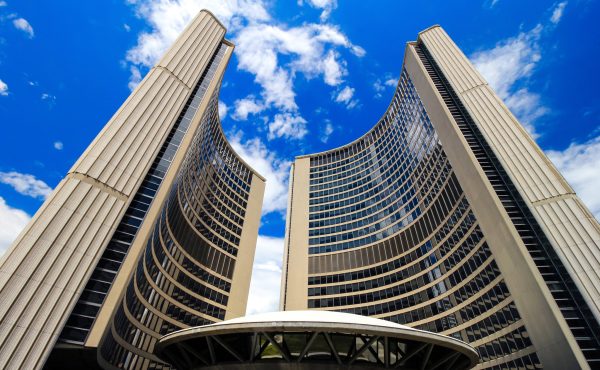

From what I can glean, there are three competing explanations for what former Liberal health minister David Caplan was up to last week when he introduced a private member’s bill that would declare the TTC an essential service.
Let’s quickly dispense with the loose cannon version. Premier Dalton McGuinty has always run a tight ship, and it’s inconceivable that a member of his caucus could introduce a private member’s bill – especially one that addressed the jurisdiction of a senior minister – without a vetting process from the central command. Indeed, as a well-placed Liberal source assured me, “This was planned.”
What the move sought to accomplish, however, remains the subject of much speculation.
Theory A: A shot of electoral ginseng for George Smitherman.
After Caplan tabled the bill and transportation minister Kathleen Wynne declared it a non-starter, the premier said in the legislature that it’s an important issue for the mayoral race. Smitherman – who hasn’t been quick off the draw with anything so far in this race – had a statement of support all teed up and ready to go:
“I want to applaud David Caplan’s Private Members’ Bill as it reflects an appropriate source of concern about the cost of a TTC strike to the city and commuters – there can be no doubt that work stoppages cause a huge disruption. I look forward to the debate continuing in the Legislature – including a full committee hearing with public consultations. Based on the outcome of that debate, we can have a fulsome discussion about the options the city might have in the future.”
In other words, he’s marking territory among right-of-centre voters.
Caplan’s move, tellingly, flummoxed Rocco Rossi’s team, forcing the candidate into the ironic position of agreeing with Mayor David Miller. Both said they opposed the move for economic reasons, arguing that arbitration rules tend to drive up settlement costs for essential service workers. They’re right, of course, but Mr. and Mrs. Fed-up Commuter may be more willing to back a candidate who appears to have the cajones to stand up to transit workers. (Hey, Mildred, did you know that Rossi fella’ was a friggin’ union-lover?)
Theory B: Payback for Miller on matters budgetary.
When Miller and budget chief Shelley Carroll unveiled the 2010 operating budget two weeks ago, it included a pair of significant political faux-pas.
1. An admission — there in on page 10 of the briefing document — that the City had explicitly violated the Liberal’s “Investing in Ontario Act” (2008) by taking the $238 million it received under the law as Toronto’s share of the provincial surplus and using those funds to reduce the 2009 operating shortfall. The Act clearly states that such monies are to be used for “capital purposes,” although the province left it up to the municipalities to decide which ones.
2. A declaration that the City and Queen’s Park must conclude a “Toronto-Ontario partnership agreement on permanent, sustainable operating funding by December 1, 2010,” i.e., Miller’s last day in office. In effect, Miller wants to go out on a high note by re-instating Bill Davis’ transit policy, which saw the city and the province divide the TTC’s operating shortfall. The mayor has pushe this rock up the hill for seven years; a 50-50 split these days is worth $250 million annually.
But here’s the thing: generally speaking, the city shouldn’t behave like it’s got the province over a barrel, but especially not when it is openly contravening a piece of legislation that seeks to ease the financial burden on property taxpayers without handcuffing municipal councils. Miller and Carroll forced Queen’s Park into a corner.
What were the Liberals to do — sue?
Indeed, McGuinty had little choice but to assert his authority. He promptly shot down Miller’s timeline, and perhaps it was no coincidence that the essential service bill materialized only a few days later. After all, Miller is philosophically opposed to removing a union’s right to strike. This was a warning.
Theory C: Another step in the slow-motion upload of the TTC to Metrolinx.
Caplan’s bill succeeded in further driving down the TTC’s stock by reminding voters about the horror of transit strikes and raising additional questions about how the agency is managed. Even more importantly, it allowed the premier to publicly signal the future mayor that the province is thinking deeply about the future of the TTC and, by implication, its relationship to Metrolinx, the transit authority that runs GO and regional transportation planning.
Evidence? Last summer, the province relieved the TTC of the responsibility of developing the new Transit City lines, assigning Metrolinx to build and own them. More recently, John Broadhead, a senior infrastructure advisor to the premier moved over to Metrolinx to oversee strategic planning and communications.
Does Metrolinx’s methodical foray into the TTC’s business end there? Unlikely. In the near future, Metrolinx is going to impose its will on the TTC about implementing Presto, the long-awaited GTA-wide smart card. And if the province does consummate a deficit-splitting deal with the city, it’s almost certain the cash will come with strings, such as a seat or two for Metrolinx on the TTC board.
As for the labour relations piece, McGuinty & Co. might be looking to eliminate the threat of TTC strikes as a pre-condition to an eventual Metrolinx takeover. That way, Queen’s Park can assure GTA commuters that they needn’t fear paralyzing strikes as a quid pro quo for asking them to fork over more cash (road tolls, parking lot levies, etc.) to underwrite the costly transit projects envisioned in Metrolinx’s Big Move plan, approved in November, 2008.
So take your pick. Either way, it is that much more evidence that this election is going to be all about the TTC.
photo by Scott Snider




13 comments
“A fulsome discussion”? Smitherman said that? Seriously?
Not that he had my vote before, but if he had, the lousy copy-editing would have now lost it for him. Personally I like Theory B.
Thanks for the breakdown John. Great insight as always.
I’m curious about your thoughts on the uploading of the TTC to the province. How would this change the system for we have now for better or worse? Does it go beyond Smartcards? Why do the TTC seem reluctant to cooperate with Metrolinx? Is it just about holding onto power?
I agree with John that TTC should be on the election front burner but not that Essential Service part of the issue which is little more than political posturing than any real change. The issue as you are hinting at is general governance and the compentency of the TTC board, management and employees. The biggest single issue to set the TTC on a new course would be to eliminate the TTC’s Building Trade union labour monopoly on public tenders. This not only is unfiar and a violation of the Toronto Fair Wage Policy but also inflates costs by at least 30% or more when there is a shortage of Infrastructure Contractors and workers due to all the infrastructure spending.
There’s no reason to think that these theories/motives are mutually exclusive. I say 20%=A, 30%=B and 50%=C.
A dangerous political gamble for McGuinty, however, because the legislation gives voters, however erronesously, the idea that the province is responsible for TTC operations. Having floated that balloon, even via friendly-fire, McGuinty looks like a lame duck by washing his hands of the TTC’s ongoing bad odour among GTA voters. These same voters are, let’s remember, the meat and potatoes of any Liberal mandate in this province.
Take over the TTC and clean house!
Surprising that the author doesn’t bother commenting on the fact that the TTC Union doesn’t really have any right to strike in the way most people would understand it. Look at what happened after their last “strike” in 2008. Union rejected the City’s offer and went on strike legally. City immediately asked province to legislate them back to work (so much for the Mayor’s belief in employee’s right to strike) — and all 3 major parties complied so that in about 24 hours, TTC union members were back at work. This is a right to strike? Seems to me that all the parties involved here (City/Mayor, Province/Premier, TTC and its union, and the media) are doing nothing but posturing.
A couple of points:
1. Right winged blowholes really have it easy when it comes to essential service. If a service is denied essential service designation, they complain that the city is pro-union and does not have the balls to stand up to them. Likewise, if a service is designated an essential service, these same blowholes will be complaining that the members are getting paid too much (more so) since all bargaining goes straight to arbitration.
2. What makes Toronto’s public transit system more “essential†than systems in other major centers in Ontario like Hamilton or Ottawa? Hell, I used to know someone who lost her job the last time Durham Region Transit went on strike, why are her commuting needs less “essential†than those in Toronto proper? For the TTC to be essential, we need clear guidelines on what makes a transit system essential in this province, besides media and politicians looking for attention.
2b. With all that said, when transit unions re-elect asshats like Bob Kinnear, a man who has a nice mix of antisocial and narcissistic personality disorders, it does make removing the PRIVILEGE to strike from transit workers quite appealing…
Samg: Your recollection is accurate, but I would also draw your attention to a TTC strike that occurred in the early 1990s that lasted for a longer period.
John, I’m aware of the incident that happened in the 1990s. But that was the 90s and the situation that I mentioned from 2008 shows that City Council is no longer willing to endure what happened in the 90s and suffer the fallout should TTC workers invoke their so-called “right to strike”. If a “right to strike” can be circumvented as easily as it was in 2008, there is no real right to strike. My point still stands that this discussion amounts to posturing on all sides.
In response to Ben’s sentiment that there need to be some sort of predetermined “standards” that govern essential-service designation, I kind of have to disagree. Trying to come up with, say, a blanket points system that objectively sorts every job in the province into one of two piles isn’t likely to be particularly easy or any more likely to reach conclusions that a consensus would back. At the end of the day, laying down the rules of how a society governs labour relations has always been political and always will be.
Each potential essential service designation should stand or fall on it’s own merits. The McGuinty position that whether the TTC should be or not be is a matter best left to Toronto’s duly-elected council is a fair one. Let Bob Kinnear make the case to the public that his organization deserves to keep enjoying the same rights and responsibilities as a garden-variety private sector union. The balance of opinion on the current council supports this belief, so he’s hardly facing an impossible task here. And if at the end of the day he fails to be persuasive, it’s not like we’re in Duplessis’s Quebec here: the basic rights to organize and receive fair compensation are in no way being challenged.
One thing I wish was a bit more present in this debate was the midway option, allowing workers to strike such that the TTC was forced down to an impaired but still operational state. Apparently Montreal has something along those lines on its books.
Having just returned from Vancouver, the thought of a region-wide equivalent to Translink is not so scary.
TTC could then become an Metrolinx-branded operator (like Coast Mountain Bus Company) with Metrolinx becoming the planning and management authority for the various GTA transit services (and having seen Seabus first hand I can’t see why the Island Ferries shouldn’t be included)
Metrolinx will certainly play an important role in developing what you describe Mark Dowling in it’s “Big Move” campaign that references the GTA as GTHA [hamilton in tha house]
GTA = GTHA? Sure, that slight adjustment in vernacular is telling a lot of the story. I don’t know how the Greater Toronto Hotel Association feels about it, but they will understand they need trains and buses to fill hotels.
@John I am a fan of metrolinx so maybe none of their executives will feel the need to reference my body parts in reference to my post the way the bike union does. Sorry Yvonne chose to do that I had no idea she wasn’t aware that not everyone thinks she is a good representative.